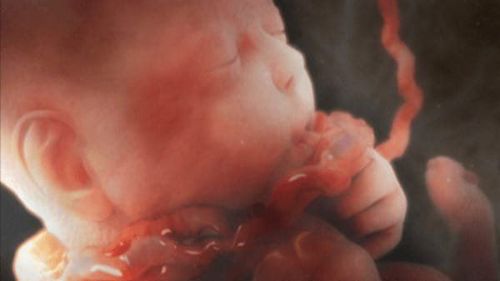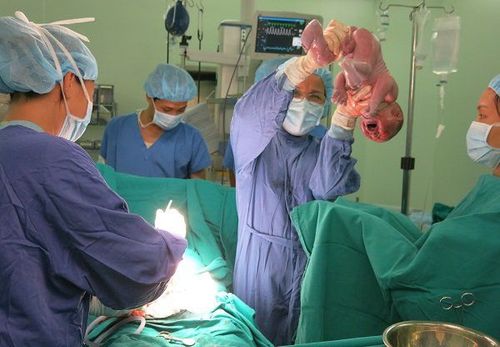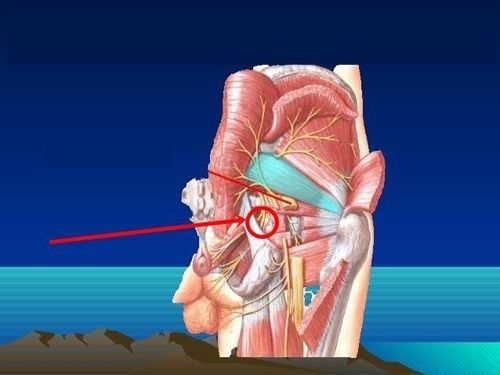This is an automatically translated article.
Urinary retention is a very common condition in postpartum women. It causes discomfort and affects daily activities for sufferers. Although it is a common condition, many people still do not know if urinary retention after childbirth is dangerous.
1. What is postpartum urinary retention?
Postpartum urinary retention is a disorder of the urinary tract after birth. This is a condition in which the patient loses the ability to empty the bladder when it is full, so there is often a feeling of needing to urinate but not being able to urinate. Currently, about 13.5% of postpartum women have urinary retention.
2. Is urinary retention after birth dangerous?
Postpartum urinary retention is very common. It is not dangerous but causes motor and sensory discomfort. Therefore, this situation causes a significant impact on the daily activities of mothers.
3. Clinical manifestations of postpartum urinary retention
Clinical manifestations of postpartum urinary retention are mothers 3-4 hours after giving birth, there is a feeling of needing to urinate but cannot urinate. On physical examination, the abdomen is soft, the area below the navel has a well-retracting uterine mass and the bladder bridge. When pressed, there is a feeling of tightness.
In addition, after being instructed to urinate by many methods such as: sitting in a natural position, applying warm compresses and turning on the faucet to flow slowly, but the women still could not urinate on their own, feeling tight. , increasing discomfort, it is necessary to immediately report to the doctor for intervention and treatment.
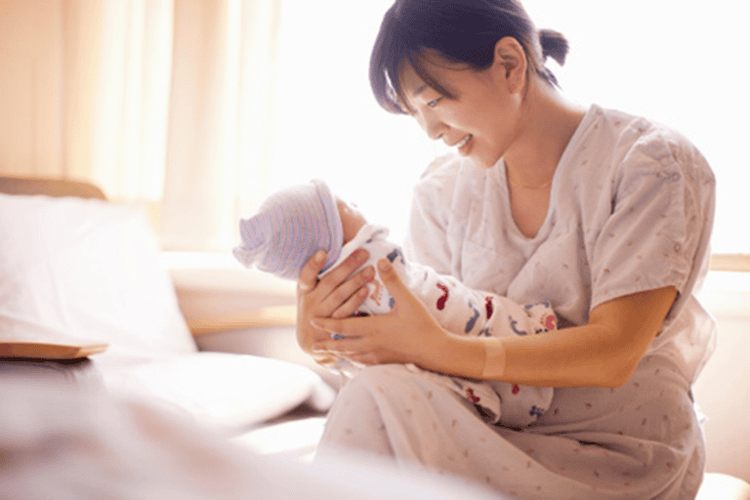
Bí tiểu sau sinh là tình trạng rối loạn đường tiểu sau khi sinh
4. Causes of urinary retention after giving birth
Causes of urinary retention after childbirth are as follows:4.1. For women who give birth naturally
During labor, the baby's head is low, pressing on the bladder neck or urethra, causing urine stagnation, causing the bladder to stretch. When stretched too much, it will lose tone and cause bladder neck muscle spasm.
Another cause of urinary retention after birth is that, in many cases, an episiotomy is required during delivery to help the baby's head come out more easily. After suturing the cut, the wound will swell, so pregnant women feel pain, so they do not dare to push when urinating. When you strain to urinate, the incision will be dilated, making the pain worse.
When a woman has urinary retention for a long time, a catheterization procedure will be performed. This procedure, if performed many times, causes cystitis, so the symptoms of urinary retention become more and more severe.
SEE ALSO: Why do you have urinary retention after cesarean section?
4.2. For women giving birth by caesarean section
Women who have a caesarean section are usually given an anesthetic before a cesarean section. After the procedure, the anesthetic remains in place and takes 8 hours to wear off. Therefore, the mother needs to wait for the anesthetic to wear off before she can urinate again.
During cesarean section, due to the impact on the body, it can cause bladder contusion. This results in bladder paralysis and urinary retention after delivery.
In addition, postpartum urinary obstruction can occur due to pelvic nerve damage during delivery.
The risk of urinary retention is increased when:
First child birth Prolonged labor During delivery with tools such as forceps, suction cup... Urinary tract infection or history of urinary disease before
5. Treatment of urinary retention after giving birth
8 hours after giving birth, if the woman still cannot urinate, the urinary catheter may need to be reinserted.
5.1. The principles of treatment
Practice urinating. Take antibiotics to fight infection. Use anti-inflammatory to prevent edema causing compression of the bladder neck. Using supportive measures to increase bladder tone helps the ability to contract the bladder back to normal.
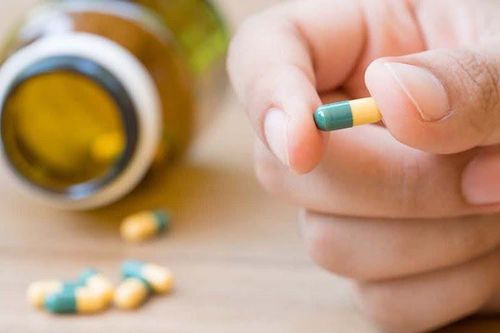
Bí tiểu sau sinh dùng thuốc kháng viêm chống phù nề chèn ép vào cổ bàng quang
5.2. Treatment process
Practice urinating: train the patient to urinate in a natural position. In women who have perineal stitches, it is necessary to avoid holding back urine due to pain. Urinary catheterization: if the woman is trying to urinate but still cannot urinate, a urinary catheter should be placed and kept for 24 hours. Remove the clamp every 3-4 hours and re-create the reflex to urinate. Every time the clamp is removed, the mother must practice pushing to urinate through the catheter. If urinating through the catheter is possible, the catheter is removed.
5.3. Using drugs
Give the patient antibiotics to fight the infection. Commonly prescribed drugs are cephalexin, doncef, augmentin. For the patient to use anti-inflammatory drugs to prevent edema pressing on the bladder neck. The commonly used anti-edema drugs: alphachymotrypsin, buscopan... The drugs that help to increase tone and contractility of the bladder are usually prostigmin or xatral. In addition, it is possible to add vitamins B1, B6 and B12 orally to improve the health of pregnant women.
In addition to modern medical measures, it is possible to treat urinary retention after birth by traditional medicine methods. With urinary retention often not treated with drugs, but can use procedures such as acupuncture, acupuncture ... Besides, it is also possible to combine some more remedies to increase the effectiveness of treatment.
6. How to prevent urinary retention after giving birth
To prevent urinary obstruction after giving birth, pregnant women need to pay attention to the following points:
Mothers need to exercise soon after giving birth. Drink a lot of water . Do not hold urine due to pain in the perineum. Train women to urinate in a natural urine position. Keep the vulva area clean and always keep the vulva area dry. Having a complete and reasonable diet for women after giving birth. Pregnant women should pay attention, if they have taken treatment measures but the condition still does not improve or if the pregnant woman feels pain while urinating or has a burning sensation when urinating, she should go to a medical facility to be visited. Find out the cause and get the appropriate treatment.
Postpartum urinary retention is not a rare condition and does not pose a danger to the mother. However, this condition can cause inconveniences that affect the daily life of pregnant women.
After giving birth, the mother's body changes, the mother can suffer from many diseases such as postpartum hemorrhage, urinary incontinence, digestive disorders, bowel and urinary disorders, rectal prolapse,... Especially, Many mothers suffer from urinary retention after giving birth. Therefore, to ensure health, after giving birth, a mother can perform a general health examination at Vinmec International General Hospital to assess her postpartum health. Mothers will have the opportunity to visit with leading specialists, combine with many other specialties to give advice, care, and help mothers improve their postpartum health, as well as how to take good care of their children. .
Please dial HOTLINE for more information or register for an appointment HERE. Download MyVinmec app to make appointments faster and to manage your bookings easily.





